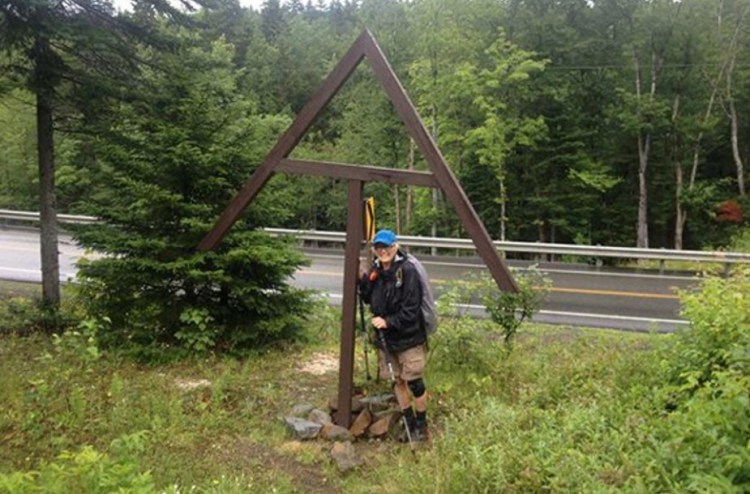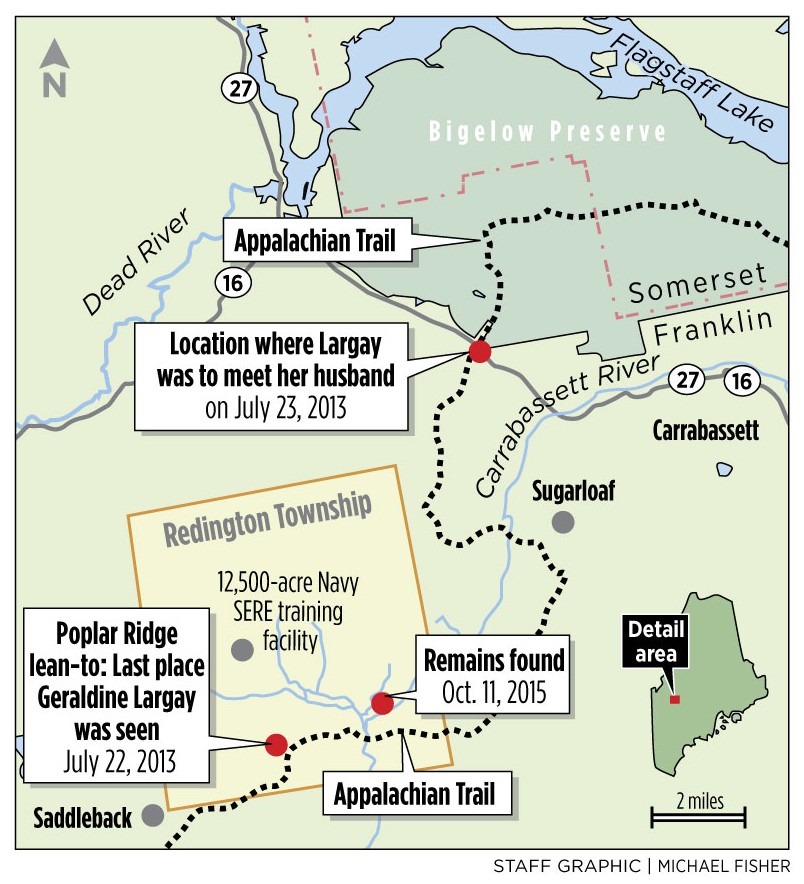Buried among the mountain of information amassed during one of Maine’s most extensive missing person searches is this detail: Appalachian Trail through-hiker Geraldine Largay did not know how to use a compass.
Largay’s remains were found more than two years after she disappeared July 22, 2013, on a section of the trail in Franklin County. Until the Maine Warden Service released its 1,500-page report Wednesday, much of what had happened to her remained a mystery.
Of all the indications in the report that Largay, 66, wasn’t prepared for the nearly 1,000-mile hike that eventually claimed her life, the fact that she was trekking through a remote wilderness but didn’t know how to use a compass is among the most startling.
“That would be a recipe for disaster,” Roger Guay, a retired game warden, said Thursday night.
A compass was found with her belongings at the campsite she’d fashioned in the woods while she was lost, but a reference on a missing person report in the case file, and a summary from an interview with Largay’s friend and hiking companion Jane Lee, said Largay didn’t know how to use the compass.
Lee told an investigator “(Largay) did not know how to use a compass. She didn’t know if Geraldine even had a compass,” the report said.
An inventory list in a missing person report in the case file said Largay left her SPOT GPS device behind in a motel and “has compass but does not or won’t use it.”
Guay said a compass is an essential tool for anyone out in the woods. “You can get caught in heavy fog and you can get off the trail,” he said. “You don’t venture into the wilderness without a compass. You’ve got to have that knowledge.”
EASY TO GET OFF TRACK
Guay was involved in many searches during his 25 years with the warden service, but said he is not qualified to speak about specifics of Largay’s case. However, there is one thing he is sure of: “In this corner of the world, it is a lot easier to get off track.”

An excerpt from a missing person report in the Maine Warden Service case file on Geraldine Largay shows she did not use a compass.
The items in the Largay case file include excerpts from a journal that Largay kept during her last weeks alive in the rugged woods of Franklin County, and paint a grim picture of the worst scenario for a through-hiker of the 2,184-mile trail that begins on Springer Mountain in Georgia and ends on Mount Katahdin in Maine. Largay, of Brentwood, Tennessee, who went by the trail name “Inchworm,” was hiking the second half, and had started in Harpers Ferry, West Virginia.
She had covered about 950 miles and had about 200 to go. But she was in what’s considered the most treacherous part of the trail. People familiar with hiking and search and rescue along Maine’s section of the Appalachian Trail say it takes only a few missteps for a hiker to get lost.
Things that Largay did, such as hike alone, leave her GPS locator in a motel, stay in one place after she got lost, and not use her compass, all decreased the likelihood that she would be found, despite what has been described by wardens as the most extensive search of its kind in the state’s history.
Largay was reported missing on July 24, 2013, after she didn’t appear at a designated meeting place with her husband, George Largay, the previous day where the trail crosses Route 27 in Wyman Township.

A memorial for Geraldine Largay was assembled at her final location, in the rugged woods of Franklin County. Photo from Maine Warden Service report
In October 2015, her remains were found in her sleeping bag zipped inside of her tent at a campsite she had set up about 2 miles from the trail on U.S. Navy land in Redington Township. She died from a lack of food and water, according to the medical examiner’s report, released in January.
Largay’s journal showed she was alive on Aug. 6, 2013, and possibly later. The warden service had scaled back its extensive search two days earlier, though it continued searches with trained dog teams and thorough grid searches. A private contractor working for the Navy stumbled across her campsite on Oct. 11, 2015.
Guay believes the warden service did all it could to find her.
“It’s tough when you have cleared all the logical areas,” Guay said. “It’s a tough call to make; no one likes to make it. You kind of come to a point, statistically, where you’re spinning your wheels.”
LOST CONNECTIONS
Every year, about 28 Appalachian Trail hikers get lost in Maine, Lt. Kevin Adam of the Maine Warden Service said shortly after Largay was reported missing.
Searchers find lost hikers within 12 hours 95 percent of the time, and within 24 hours in 98 percent of the cases.
The release Wednesday of the warden service report answered questions about what had happened to Largay, and highlighted how ill-prepared she was for the grueling hike.
She was hiking the Maine stretch of the trail alone, after Lee, her friend and trailmate, had to leave because of a family emergency. Largay was relying on her Samsung cellphone to keep in touch with her husband, who met her every few days with supplies. After she got lost, she tried texting her husband, but because there was no cellphone service, he never got the messages.

Warden Roger Guay points out a dangerous area along the hiking trail at Gulf Hagas to fellow Warden Pat Dorian in 1995. Guay, who retired after 25 years with the Maine Warden Service, has been involved in more searches for missing people than he can count. He said hikers have to be prepared, to stay alive and to help searchers find them. Press Herald file photo/John Ewing
“Over my career, I would usually get a call at least once a summer from a family member who had been in cell contact with their hiker and had lost contact with them,” Guay said. “I would ask, ‘Where did you lose contact?’ and it would be, ‘Oh, the Maine border.”
Shane Vorous, who operates the Stratton Motel with his wife, Stacey, said Thursday that they try to tell hikers where they are likely to get cellphone service and where known dead zones are along the Appalachian Trail.
“As far as cellphone coverage, we do know a lot of where the coverage is and where it isn’t. And when we have people stay here, we try to help them understand where it works and where it doesn’t,” Vorous said.
Both Vorous and Guay were adamant that every hiker should carry an emergency locater beacon, which, when activated, transmits a hiker’s location using satellites, allowing rescuers to find them. Largay apparently didn’t have one.
“The best thing you can do is have an ELB,” Guay said. “It’s pretty cheap insurance when you are hiking big sections of the trail like that.”
Lee, who hiked the trail with Largay until they reached Maine, told investigators that Largay had become lost or had fallen behind several times, and Lee had to backtrack to find her.
The report also said that Largay had a poor sense of direction, got flustered easily, and was scared of the dark and of being alone.
All of those issues are heightened when hiking alone.
“What you would have happen (if you hiked with someone), is the calming effect that you’re not alone. If you’ve ever been lost, it adds to panic very easily,” Guay said.
He said that when someone is hiking alone and gets lost, they often switch their focus solely to survival and not enough on helping themselves be found, as Largay apparently did when she set up her camp and waited for a rescue.
Guay said when people get lost, they should find an open area and try to “catch an eye” from the air by making a fire or spell the word “help” with fir boughs. The report documented attempts that Largay made to start a fire at her campsite.
“All of those things are critical. Unfortunately, if you’re not moving and you’re not trying to help yourself be found, (rescuers) would have to come right onto you to find you,” Guay said.

Members of the recovery team that brought Geraldine Largay’s remains and effects out of the remote woods walk past a body of water near the mountains of Franklin County. Doug Dolan of the Maine Appalachian Trail Club says, “Maine has some of the most rugged terrain on the Appalachian Trail.”
MYSTERIOUS DISAPPEARANCE
Largay’s final journal entry was for Aug. 18, though the warden service said it isn’t sure if the date is accurate.
During the extensive search after Largay’s disappearance, searchers with dogs came close to her campsite, once coming within about 100 yards of where her remains were found.
Adam, who led the warden service search effort, said shortly after Largay disappeared that the search was “mystifying.”
“We’ve done a lot of tactics that would normally produce results by now,” he said on July 28, 2013. “Why, all of a sudden, did she disappear?”
At the time of her disappearance, it was believed, because of a tip that turned out to be false, that she had made it to the Spaulding lean-to – a 9-mile hike from the Poplar Ridge lean-to that she had left around 7 a.m. on July 22. Extensive grid searches in the weeks immediately after she disappeared were to the west of where she was found, warden service maps showed.
Guay said wardens try to never let it enter their heads that they might not find someone, because that is the most difficult reality they have to face.
“It’s hard to tell a family we’ve done all we can do for now until a new lead shows up,” he said. “It’s the hardest thing to deal with as a game warden.”
Copy the Story Link
Send questions/comments to the editors.




Success. Please wait for the page to reload. If the page does not reload within 5 seconds, please refresh the page.
Enter your email and password to access comments.
Hi, to comment on stories you must . This profile is in addition to your subscription and website login.
Already have a commenting profile? .
Invalid username/password.
Please check your email to confirm and complete your registration.
Only subscribers are eligible to post comments. Please subscribe or login first for digital access. Here’s why.
Use the form below to reset your password. When you've submitted your account email, we will send an email with a reset code.